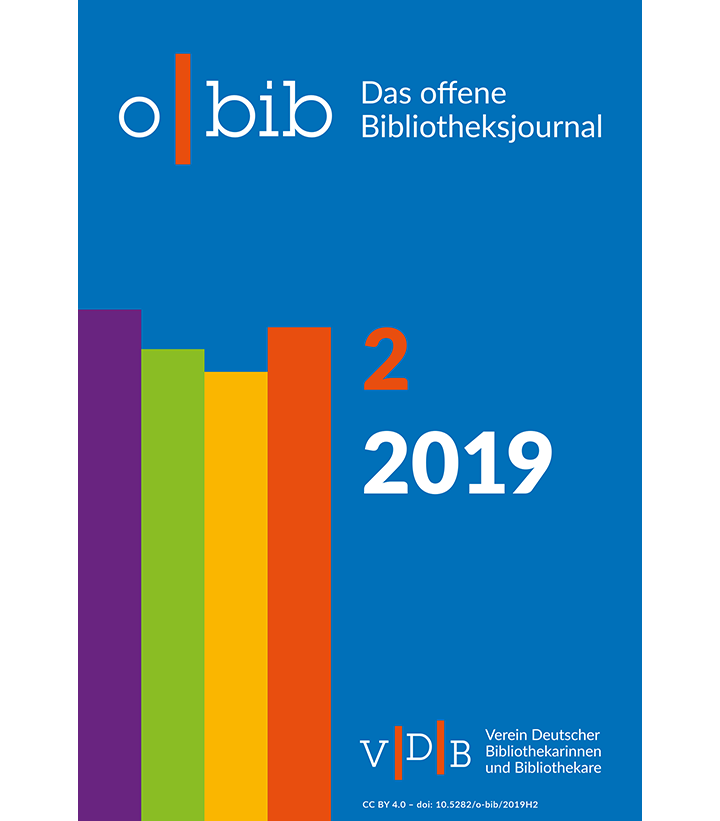Predatory Publishing - Herausforderung für Wissenschaftler/innen und Bibliotheken
DOI:
https://doi.org/10.5282/o-bib/2019H2S17-32Keywords:
Predatory Publishing, Fake Journals, RaubverlageAbstract
In the summer of 2018 predatory publishing has come to the public fore in many countries through widespread media coverage. Newspapers, radio stations and TV stations in various countries, among them German speaking countries, reported over the course of several weeks extensively about these fraudulent business practices. The problem, which is steadily increasing, has been well known in the scientific community for years. Since 2017, the publishing services at University of Graz, a cross-departmental unit at the University Library, has provided information and guidance regarding predatory publishing for both scholars and students. The first section of this article provides seminal information on predatory publishing as well as the related topics of fake science and fake news, which both have also been discussed in this context in the media. The final two sections deal with practical implications. They present reasons why universities should address the problem of predatory publishing and explain the efforts of librarians at the University of Graz to raise awareness for predatory publishing and to provide services to aid in that matter.
References
- Boucherie, Sacha: „’Predatory’ vs trustworthy journals: What do they mean for the inte¬grity of science?”, elsevir.com, 15.08.2018, https://www.elsevier.com/connect/predatory-vs-trustworthy-journals-what-do-they-mean-for-the-integrity-of-science, Stand: 09.04.2019.
- Cenyu, Shen; Bo-Christer, Björk: ‘Predatory’ open access: a longitudinal study of article volumes and market characteristics, in: BMC Medicine 13 (230), 2015, S. 1-15. Online: https://doi.org/10.1186/s12916-015-0469-2.
- Dadkhah, Mehdi; Maliszewski, Tomasz; Jazi, Mohammad Davarpanah: Characteristics of Hijacked Journals and Predatory Publishers. Our Observations in the Academic World, in: Trends in Pharmacological Sciences 37 (6), 2016, S. 415-418.
- Deprez, Esmé E.; Chen, Caroline: Medical Journals Have a Fake News Problem, Bloomberg Businessweek 29.08.2017, https://www.bloomberg.com/news/features/2017-08-29/medical-journals-have-a-fake-news-problem, Stand: 009.04.2019.
- Hus, Jasmin: Alles nur geklaut, AirCampus, 11.06.2018, https://www.aircampus-graz.at/podcasts/fake/, Stand: 09.04.2019.
- Hornung, Peter; Eckert, Svea; Harland Christina: Warum so viele Forscher auf unseriösem Weg publizieren, ndr.de, 19.07.2018,
- https://www.ndr.de/nachrichten/niedersachsen/wissenschaftsskandal102_page-2.html, Stand: 09.04.2019.
- Larkin, Marilynn: „Mentors help authors say ‘no’ to predatory journals”, elsevir.com, 14.11.2018, https://www.elsevier.com/connect/mentors-help-authors-say-no-to-predatory-journals, Stand: 09.04.2019.
- Larkin, Marilynn: „To thwart predatory publishing, we need to work together”, elsevir.com, 11.10.2018, https://www.elsevier.com/connect/to-thwart-predatory-publishing-we-need-to-work-together, Stand: 09.04.2019.
- Narodoslawsky, Benedikt: Nicht alles, was wie Wissenschaft aussieht, ist Wissenschaft, falter.at, 31.07.2018, https://www.falter.at/archiv/wp/nicht-alles-was-wie-wissenschaft-aussieht-ist-wissenschaft, Stand: 09.04.2019.
- Readfearn, Graham: Murky world of ‘science’ journals a new frontier for climate deniers, The Guardian, 24.01.2018, https://www.theguardian.com/environment/planet-oz/2018/jan/24/murky-world-of-science-journals-a-new-frontier-for-climate-deniers, Stand: 09.04.2019.
- Reuning, Arndt: Problem Pseudojournale „nicht wirklich lösbar“, deutschlandfunk.de, 20.07.2018, https://www.deutschlandfunk.de/fake-science-problem-pseudojournale-nicht-wirklich-loesbar.676.de.html?dram:article_id=423465, Stand: 09.04.2019.
- Römer, Jörg: Forscher narrt Fachmagazin mit absurder Klo-Studie, spiegel.de, 06.07.2018, http://www.spiegel.de/wissenschaft/mensch/quatsch-studie-forscher-narrt-fachmagazin-mit-klo-studie-a-1216792.html, Stand: 09.04.2019.
- Spears, Tom: The editor is diseased. Fake science journals hit new low, Ottawacitizen.com, 26.10.2015, https://ottawacitizen.com/technology/science/the-editor-is-late-fake-science-journals-hit-new-low, Stand: 09.04.2019.
- van Wesel, Maarten: Evaluation by Citation: Trends in Publication Behavior. Evaluation Criteria, and the Strive for High Impact Publications, in: Science and Engineering Ethics 22 (1), 2016, S. 199-225. Online: https://doi.org/10.1007/s11948-015-9638-0.
- Weingart, Peter: Vertrauen, Qualitätssicherung und Open Access – Predatory Journals und die Zukunft des wissenschaftlichen Publikationssystems, in: Weingart, Peter; Taubert, Niels (Hg.): Wissenschaftliches Publizieren. Zwischen Digitalisierung, Leistungsmessung, Ökonomisierung und medialer Beobachtung, Berlin 2016, S. 283-289. Online: https://doi.org/10.1515/9783110448115-013.
Downloads
Published
Issue
Section
License
Copyright (c) 2019 Clara Ginther, Karin Lackner

This work is licensed under a Creative Commons Attribution 4.0 International License.





